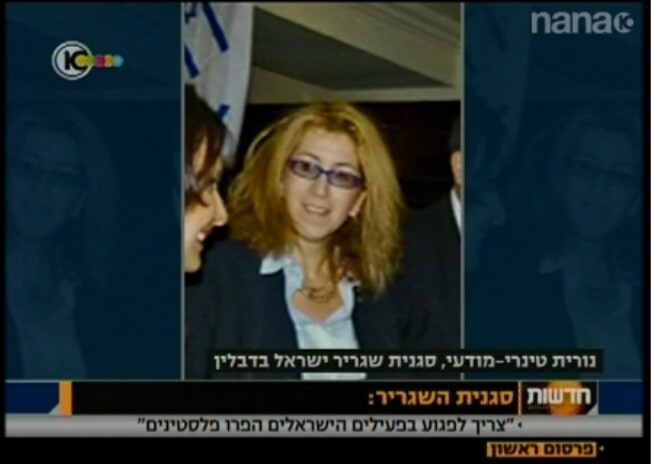3 January 2014

Screenshot of Nurit Tinari-Modai, Israel’s deputy ambassador in Dublin, from a Channel 10 news report on her scheme to smear activists.
Offending and attacking its host country, plotting against activists, complaining about journalists and spewing racism on Facebook and Twitter.
You would think an embassy that has made headlines around the world for such gaffes would be an embarrassment to the country it represents.
Not so when it comes to the Israeli embassy in Dublin. It has just won an award for its online hasbara (propaganda) from the Comper Center for the Study of Antisemitism and Racism at Haifa University.
“The annual appreciation for extraordinary hasbara activity was granted today … to Israel’s ambassador to Ireland, Boaz Modai, and his deputy, Nurit Tinari-Modai, by the unique academic program ‘Ambassadors Online,’ which trains students for pro-Israel hasbara activity online,” the university’s website reported on 31 December.
The pair’s supposed achievements include “activity in the struggle against those who promote the economic-cultural boycott of Israel and against anti-Semitic agents” as well as “exposing Israeli culture and the variety of Israel’s tourist locations and technological achievements to the residents of Ireland.”
They also received recognition for “the recruitment of supporters and citizens who are willing to identify with and protect the image of Israel.”
The citation notes that Tinari-Modai, who is both deputy ambassador and spouse of ambassador Boaz Modai, was present for the award ceremony along with Arthur Cole, deputy general manager for “communication and hasbara at the Ministry of Foreign Affairs,” and dean of students professor Hanan Alexander.
“Embarrassing provocations”
In contrast to the glowing award citation, Israel’s Dublin embassy has, by any reasonable standard, been a public relations catastrophe for Israel, especially in its host country Ireland.
In December 2012, the embassy caught the attention of The New York Times news blog The Lede when it posted – and, following an outcry, later deleted – an offensive “Christmas thought,” suggesting that if Jesus and Mary lived in present times they would “probably end up being lynched in Bethlehem by hostile Palestinians.”
The Israeli foreign ministry admitted that removing the offensive post was the “right” thing to do. The incident was, according to Haaretz’s Barak Ravid, merely the latest in a series of “embarrassing provocations by Israel’s envoys at the mission, who try to think creatively when it comes to public relations (hasbara).”
Another of the embassy’s truimphs, noted by the Times, had been posting a video clip from the Israeli right-wing program Latma TV featuring a stereotyped depiction of an Irish person.
Last September, The Irish Times – Ireland’s newspaper of record – reported on the embassy’s ongoing public relations catastrophes, after Israeli diplomats tweeted and then deleted a statement that Hitler would have loved the United Nations because of its supposed anti-Israel bias.
And last month, Irish radio journalist Peter Kearney wrote for The Electronic Intifada about his unexplained suspension by Dublin’s Near FM radio station following complaints by the embassy about a program he hosted which discussed Israeli violations of Palestinian rights.
Possibly the strangest episode involving the embassy, however, was Tinari-Modai’s plan, revealed by Israeli media in 2012, to defame critics of Israel in Ireland with a campaign to paint them as Mossad agents and sexual deviants and to post their pictures online.
If all of this is what academics at Haifa University consider to be positive public relations for Israel, it is hard to fathom what they think bad publicity would look like.
University complicity
The Comper Center’s “Ambassador’s Online” program describes itself as “an academic program which trains students for teaching, research, and activism against the new anti-Semitism and the attempts to delegitimize Israel using the means of new media.”
While its award to the Israeli embassy in Dublin elicits well-deserved mockery, it also highlights the ongoing complicity between Israeli academic institutions and anti-Palestinian propaganda initiatives by and on behalf of the Israeli government.
With thanks to Dena Shunra for translation and analysis.




